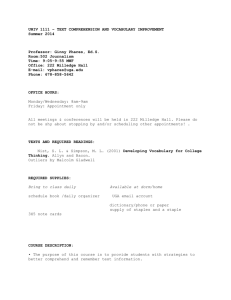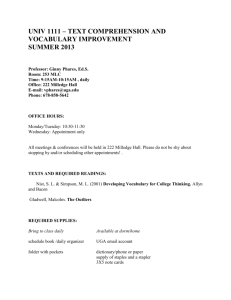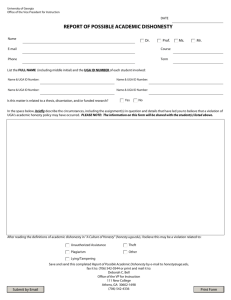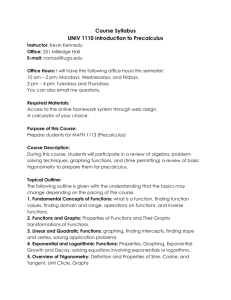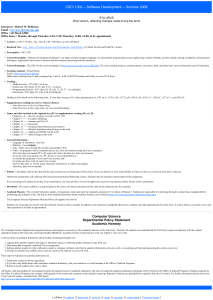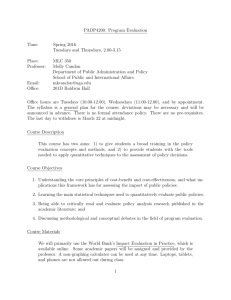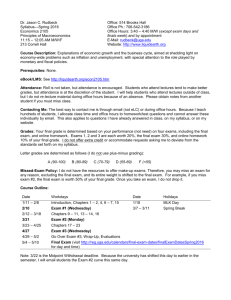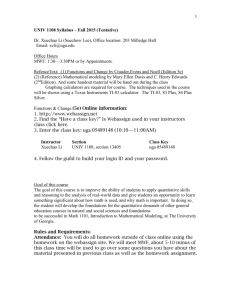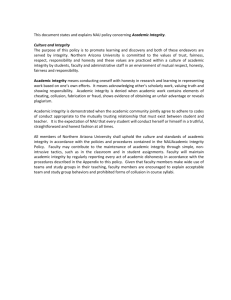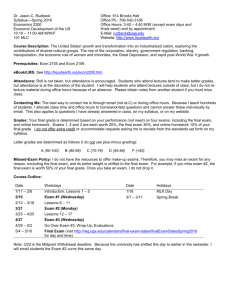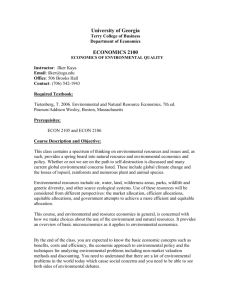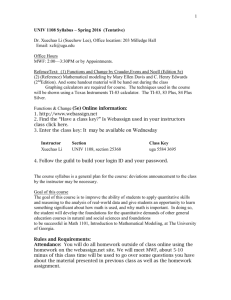UNIV 1111 – Text Comprehension and Vocabulary Improvement
advertisement
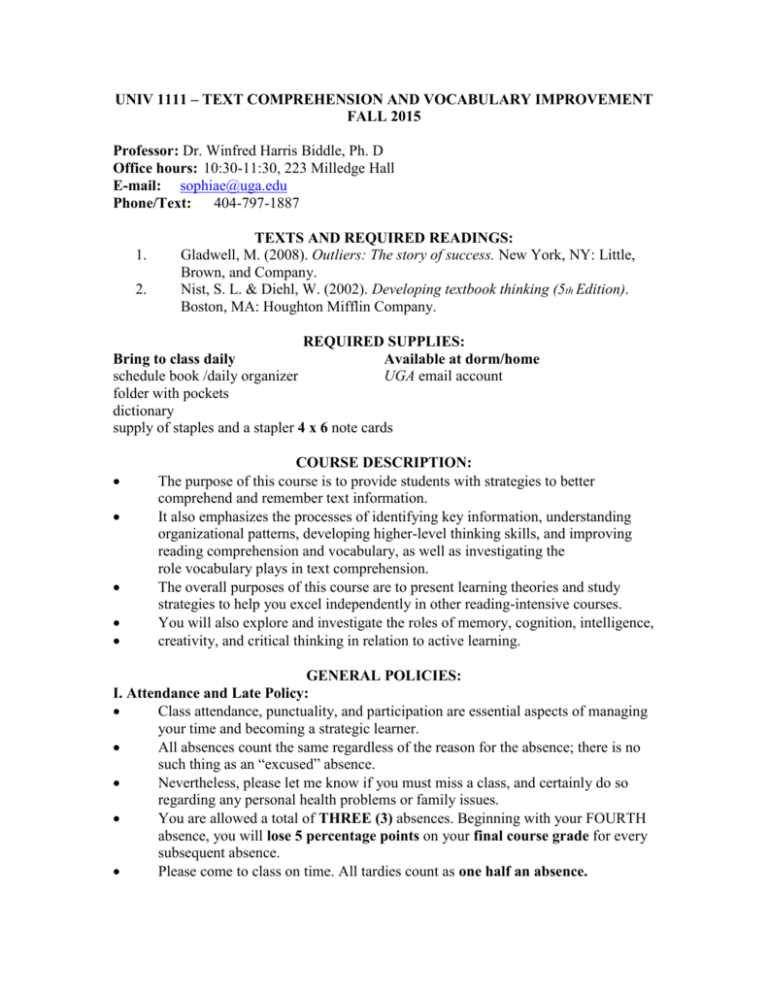
UNIV 1111 – TEXT COMPREHENSION AND VOCABULARY IMPROVEMENT FALL 2015 Professor: Dr. Winfred Harris Biddle, Ph. D Office hours: 10:30-11:30, 223 Milledge Hall E-mail: sophiae@uga.edu Phone/Text: 404-797-1887 1. 2. TEXTS AND REQUIRED READINGS: Gladwell, M. (2008). Outliers: The story of success. New York, NY: Little, Brown, and Company. Nist, S. L. & Diehl, W. (2002). Developing textbook thinking (5th Edition). Boston, MA: Houghton Mifflin Company. REQUIRED SUPPLIES: Bring to class daily Available at dorm/home schedule book /daily organizer UGA email account folder with pockets dictionary supply of staples and a stapler 4 x 6 note cards COURSE DESCRIPTION: The purpose of this course is to provide students with strategies to better comprehend and remember text information. It also emphasizes the processes of identifying key information, understanding organizational patterns, developing higher-level thinking skills, and improving reading comprehension and vocabulary, as well as investigating the role vocabulary plays in text comprehension. The overall purposes of this course are to present learning theories and study strategies to help you excel independently in other reading-intensive courses. You will also explore and investigate the roles of memory, cognition, intelligence, creativity, and critical thinking in relation to active learning. GENERAL POLICIES: I. Attendance and Late Policy: Class attendance, punctuality, and participation are essential aspects of managing your time and becoming a strategic learner. All absences count the same regardless of the reason for the absence; there is no such thing as an “excused” absence. Nevertheless, please let me know if you must miss a class, and certainly do so regarding any personal health problems or family issues. You are allowed a total of THREE (3) absences. Beginning with your FOURTH absence, you will lose 5 percentage points on your final course grade for every subsequent absence. Please come to class on time. All tardies count as one half an absence. II. Expectations Regarding Assignments: You are responsible for all work assigned or notes given in class even if you are absent. If you miss class, you should obtain the notes. Consider exchanging phone numbers and/or e-mail addresses with someone to provide note and pick up handouts. Late work will not be accepted unless you have a documented emergency. To increase the chance you will receive a response BEFORE the next day’s class, all emails pertaining to the next day’s class must be received by 4 PM In the case of a rare, documented emergency (such as a family crisis or personal illness), please be sure to call or e-mail me, and also obtain documentation if at all possible. In such an instance, we will make a decision together about when your work is due. If you show up for the next class period and have not contacted me by phone or e-mail, I will give you feedback on the assignment but I WILL NOT ACCEPT YOUR WORK FOR A GRADE. III. Grading Procedures: UNIV 1111 is an elective degree credit course that counts toward hours for the HOPE Scholarship, as well as the 3.0 GPA required to maintain a HOPE Scholarship. GRADING: Assignments Library/ Internet Project Reading Rate Project Quizzes Unit Tests (2) Final Exam 10% (homework, primarily) 15% 15% 20% 20% 20% (Comprehensive) ** There will not be last minute extra credit assignments to bring up low grades. DO NOT ASK. INSTEAD, TURN IN YOUR BEST WORK THROUGH-OUT THE TERM IN ORDER TO ENSURE THE GRADE YOU WISH TO ACHIEVE.* * A = 92 to100 = 4.0 A- = 89 to 91 =3.7 B+ = 87 to 88 = 3.3 B = 82 to 86 = 3.0 B- = 79 to 81 = 2.7 UGA Grading Scale C+ = 77 to 78 = 2.3 C = 72 to 76 = 2.0 C- = 69 to 71 = 1.7 D = 60-68 = 1.0 F = < 60 = 0.0 The course syllabus is a general plan of study for this course and the instructor will announce any necessary deviations from it. UNIVERSITY HONOR CODE All academic work must meet the standards contained in “A Culture of Honesty.” Students are responsible for informing themselves about those standards before performing any academic work. All students are responsible for maintaining the highest standards of honesty and integrity in every phase of their academic careers. The penalties for academic dishonesty are severe and ignorance is not an acceptable defense at the University of Georgia. “Academic Honesty” means performing all academic work without plagiarism, cheating, lying, tampering, stealing, receiving unauthorized or illegitimate assistance from another person, or using any source of information that is not common knowledge. “Academic Dishonesty” means knowingly performing, attempting to perform, or assisting any other person in performing any academic work that does not meet this standard of academic honesty. Assistance by another, when authorized by the faculty member, will not be considered academically dishonest, nor will using information that is fairly attributed to the source. If you have any questions about what is considered academic dishonesty, please read the information at http://www.uga.edu/honesty/ - so you understand how the term “academic dishonesty” is interpreted on this campus. I have read and understand the syllabus for UNIV 1111, and any questions and concerns have been clarified. I have also read and understand “A Culture of Honesty at the University of Georgia,” which explains the university’s academic honesty policy. I agree to these terms and understand that I may consult the following website for more information on the UGA academic honesty policy and procedures: http://www.uga.edu/honesty/ Please sign, date, and return this form to Dr. Biddle by AUGUST 24, 2015. Name Printed __________________________________________________ Signature ________________________________ Date ________________ E-mail address: ________________________________ Phone # ________________________________ ........................................................................
